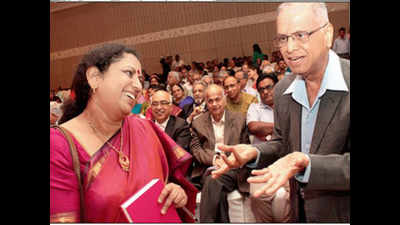- News
- City News
- bengaluru News
- 8 centuries on, Harishchandra Kavya speaks to reader in English
Trending
This story is from January 17, 2017
8 centuries on, Harishchandra Kavya speaks to reader in English
Eight centuries after 13th-century poet Raghavanka penned Harishchandra Kavya, the Kannada classic has been translated into English from Halegannada (Old Kannada).

Eight centuries after 13th-century poet Raghavanka penned Harishchandra Kavya, the Kannada classic has been translated into English from Halegannada (Old Kannada).
BENGALURU: Eight centuries after 13th-century poet Raghavanka penned Harishchandra Kavya, the Kannada classic has been translated into English from Halegannada (Old Kannada). The Kavya, though, has been translated from Kannada into Kannada many times over.
Raghavanka, who penned the Kavya in Shatpadi metre native to Kannada prosody (chandassu), was a rebel. If the famous legend of his maternal uncle Harihara, an already-established writer, slapping Raghavanka for writing about a mortal king (Harishchandra) as opposed to writing about Lord Shiva is one example, Raghavanka breaking the existing pattern of Champu Kavya - a mix of prose and poetry -to employ Shatpadi is another.
Acknowledging the complexity, Vanamala Viswanatha, who has translated Harishchandra Kavya into English for the Murty Classical Library of India (MCLI), said: "Translators of classics are like Hanuman carrying the entire mountain to just bring one plant to save Lakshmana."
She said translators need to bring text from the past and relocate them. "It has to leap across time, place and sensibilities and it's a huge leap," she said, adding that the toughest gap to bridge is the gap between sensibilities.
On the challenges of bridging gaps between sensibilities, Vanamala said: "We have to translate what is hyperbolically overstated into an understatement. We must translate it without compromising on the integrity, but be communicable to modern audience."
Sudha Murty, Infosys Foundation chairperson and MCLI founder Rohan's mother, said her first introduction to Raghavanka's Harishchandra was from her mother. "I was only eight or ten years old when she taught me Raghavanka. She said if I didn't learn then, I'd never appreciate things when I grew up."
Vanamala's work, in line with MCIL tradition, is a dual-language volume with the original published on even pages. Sunil Sharma, professor of Persian and Indian Literatures, Boston University, said it will add to the mosaic of literary work in India's regional languages.
"There is particularly a richness in biographical writings, whether it be of legendary kings or historical ones. While Raghavanka's work was among the ones that form the original mosaic, the translation gives contemporary readers a chance to comprehend it," Sharma, MCLI editorial board member, said.
Raghavanka, who penned the Kavya in Shatpadi metre native to Kannada prosody (chandassu), was a rebel. If the famous legend of his maternal uncle Harihara, an already-established writer, slapping Raghavanka for writing about a mortal king (Harishchandra) as opposed to writing about Lord Shiva is one example, Raghavanka breaking the existing pattern of Champu Kavya - a mix of prose and poetry -to employ Shatpadi is another.
Acknowledging the complexity, Vanamala Viswanatha, who has translated Harishchandra Kavya into English for the Murty Classical Library of India (MCLI), said: "Translators of classics are like Hanuman carrying the entire mountain to just bring one plant to save Lakshmana."
She said translators need to bring text from the past and relocate them. "It has to leap across time, place and sensibilities and it's a huge leap," she said, adding that the toughest gap to bridge is the gap between sensibilities.
Vanamala's work, Raghavanka's The Life of Harishchandra was released on Monday as part of MCLI's third series. It's the first Kannada work commissioned for translation by the initiative, which will release three other books in the third series. Translations of works from Pali, Prakrit, Sanskrit, Urdu, Persian, Hindi, Punjabi, Telugu, Marathi and Bangla have already been released.
On the challenges of bridging gaps between sensibilities, Vanamala said: "We have to translate what is hyperbolically overstated into an understatement. We must translate it without compromising on the integrity, but be communicable to modern audience."
Sudha Murty, Infosys Foundation chairperson and MCLI founder Rohan's mother, said her first introduction to Raghavanka's Harishchandra was from her mother. "I was only eight or ten years old when she taught me Raghavanka. She said if I didn't learn then, I'd never appreciate things when I grew up."
Vanamala's work, in line with MCIL tradition, is a dual-language volume with the original published on even pages. Sunil Sharma, professor of Persian and Indian Literatures, Boston University, said it will add to the mosaic of literary work in India's regional languages.
"There is particularly a richness in biographical writings, whether it be of legendary kings or historical ones. While Raghavanka's work was among the ones that form the original mosaic, the translation gives contemporary readers a chance to comprehend it," Sharma, MCLI editorial board member, said.
End of Article
FOLLOW US ON SOCIAL MEDIA










